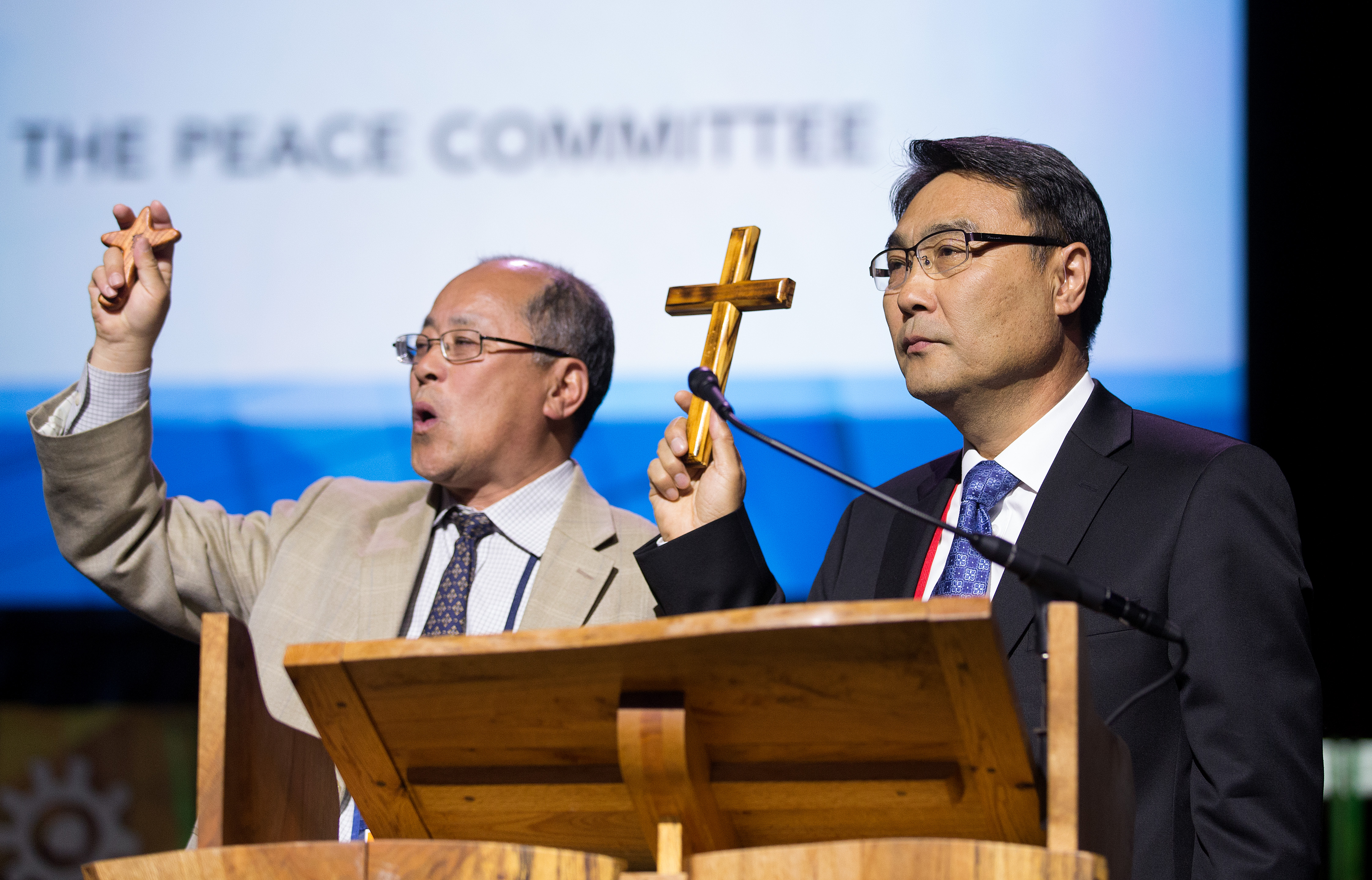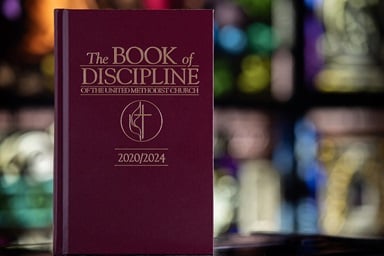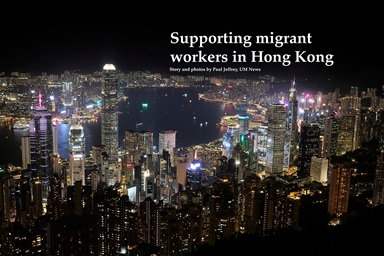The reunification of the Korean peninsula has been a longtime pursuit of Christians around the world.
So, the news of the April 27 summit between Kim Jong Un of North Korea and Moon Jae-in of South Korea — in Panmunjom, part of the Demilitarized Zone that separates the two countries — brought hope to many, before and after the event.
United Methodist Bishop Hee-Soo Jung of Wisconsin, who moved to the U.S. from South Korea in 1982, called the meeting “an answer to millions of prayers across decades.”
Healing and reconciliation is a duty of the church, says Jung, who was part of a World Council of Churches delegation to North Korea in 2015.

The Revs. Kun Sam Cho (left) and James Chongho Kim hold crosses symbolizing the two Koreas, during a report from the Committee on Peace by the Korean Association of the United Methodist Church May 19 at the 2016 United Methodist General Conference in Portland, Ore. Photo by Mike DuBose, UMNS.
Harrisburg Area Bishop Jeremiah Park, also born in Korea, wrote that the televised moment of the two leaders crossing the demarcation line to shake hands was surreal and emotional for him.
“The agreements made are aspirational in many aspects at this point,” he said. “But an incredible giant first step was taken in an unprecedented fashion.”
Sung-ok Lee observed the historic moment as “one of millions of separated families longing to be reunited with family members in the North.”
Lee — the connectional officer of United Methodist Women and a founding member of Women Cross DMZ, an international peace activist organization — said she joins “Korean women, North and South, and all international peace-loving people, in celebrating the Inter-Korean Summit and Panmunjeom Declaration.”
In their declaration, Kim, chairman of the State Affairs Commission, Democratic People’s Republic of Korea, and Moon, president of the Republic of Korea, committed the two countries to talking about removing or banning nuclear weapons and bringing a formal end to the Korean conflict.
As president of the United Methodist Board of Global Ministries, Jung joined Thomas Kemper, the mission agency’s top executive, in welcoming pledges toward permanent peace and reunification from the two Korean leaders.
“We prayerfully wish that these two leaders will lead, and that their neighbors will be supportive of their efforts in diplomacy, also involving China and the United States. We are thankful for this marvelous encounter,” said the statement from Global Ministries.
General Conference, The United Methodist Church’s top legislative body, has adopted numerous resolutions over the years calling for a lasting reconciliation for the Korean peninsula, including “Korea Peace, Justice and Reunification."
Although they “had hoped and prayed for many years,” Peggy Billings said she and many of her colleagues and Korean friends weren’t sure they would live to witness what happened on April 27.
Billings, a former staff executive with Global Ministries and the Women’s Division, arrived in Pusan, Korea, as a Methodist missionary in 1953 and served as director of the TaiWha (then Mapo) Christian Social Center in Seoul from 1954-64.
“I’m here to see the beginning of what I hope will be a good outcome,” she said from her home in upstate New York, adding that the people of Korea have suffered for so long and their desire for reunification is so strong. “It’s wonderful to see the possibility, at least, that something might change,” she said.
The longtime ecumenical effort for peace and reunification has been supported by the Korean Methodist Church, the National Council of Churches in Korea, the National Council of Churches of Christ in the USA and the World Council of Churches, among other religious organizations.
“Having recognized the absurdity and pain brought forth by separation, for more than 50 years the NCCK has worked for the reconciliation and peace of Korea while praying without ceasing,” the Korean church council said in a statement.
But churches also drew harsh criticism because that advocacy work meant maintaining contact with Christians in North Korea and other communist countries, like Cuba, China and the Soviet Union, said Jim Winkler, a United Methodist who leads the U.S. council.
That contact, he told United Methodist News Service, “played an inestimable contribution to enabling nations engaged in both hot and cold wars to find a path to peace.” Even now, Winkler said, “the WCC, the NCC Korea, and the NCC USA are helping to mend the fabric of peace with North Korea because of our determination to pray together, to talk together, and to walk together.”
Calls for peace on the Korean peninsula were long dismissed as impossible by political “realists,” noted the Rev. Olav Fykse Tveit, who leads the WCC. “But peace is possible.”
Northern Illinois Bishop Sally Dyck, a member of the WCC’s steering committee, believes that if steps toward unification continue, “it will be a wonderful sign of hope to the rest of the world.”
She was among a group of Chicago-area religious leaders participating in an April 27 press conference with South Korea’s Consul General Jong-Kook Lee. The dream of peace and reunification is “just like a little seedling,” she told United Methodist News Service. “We need politics and prayers, and lots of other things, to nurture it.”
The Rev. Martin Lee, director of congregational development for the Northern Illinois Conference, served in the U.S. Marines at the DMZ and experienced the threat from North Korean soldiers.
However, he has learned that North Koreans feel fear toward the U.S. Just about every family knows someone who died from U.S. bombings during the Korean War, he said.
“When I was watching Kim Jong Un’s comments, I felt that he genuinely desired peace on the Korean peninsula,” Lee said. “He was direct and also vulnerable, for example, when President Moon Jae-in said he wanted to visit the North Korean mountain Baek Do, Kim Jong Un admitted that the infrastructure leading to the mountain is poor. Previously, North Korean leaders always insisted they were the best and focused on propaganda.”
Retired Bishop Young Jin Cho, who served as a residential bishop in Virginia, celebrated the agreement but sounded a note of caution.
“In the past the North and South Korean presidents met twice. They made a great statement but since then, another nuclear weapon was developed,” said Cho, who has done work with North Korean refugees in the United States.
Bishop Eduard Khegay, whose immense Eurasia Episcopal Area borders North Korea, traces his family roots four generations ago to Korea.
As someone who grew up under Soviet Communist rule, he said any transition North Korea undergoes will not be easy. But he remains hopeful for the people who now live in the land of his ancestors.
“It breaks my heart when I see Korea divided,” he said. “Because I grew up in Communist Soviet time, I think it’s the Cold War between the Soviet Union and the United States that created this problem. We need to contribute, as Russians, Americans, Chinese and Japanese, to bring peace to the peninsula. As Christians, I think it is important to pray for our brothers and sisters.”
Just last week, he and other United Methodists in his area opened a mission center in Vladivostok, near the North Korean border, as a place of prayer for reunification and raising Christian leaders. There are workers from North Korea laboring in the far east of Russia, he said.
“I just pray that there will be opportunity to build relationships,” he said. “I also pray God gives me the opportunity to meet Kim Jong Un.”
Bloom is the assistant news editor for United Methodist News Service and is based in New York.
Follow her at https://twitter.com/umcscribe or contact her at 615-742-5470 or [email protected]. To read more United Methodist news, subscribe to the free Daily or Weekly Digests.
Like what you're reading? Support the ministry of UM News! Your support ensures the latest denominational news, dynamic stories and informative articles will continue to connect our global community. Make a tax-deductible donation at ResourceUMC.org/GiveUMCom.




